
The Masked Ball
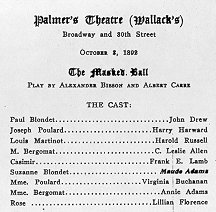
The play opened Oct. 8, 1892 (another source says Oct. 3rd) at Palmer's Theatre, Broadway and 80th St. The play was by Alexander Bisson and Albert Carre and was adapted by Clyde Fitch. Maude Adams played Suzanne Blondet, and her mother, Annie Adams, played the character Mme. Bergonon.
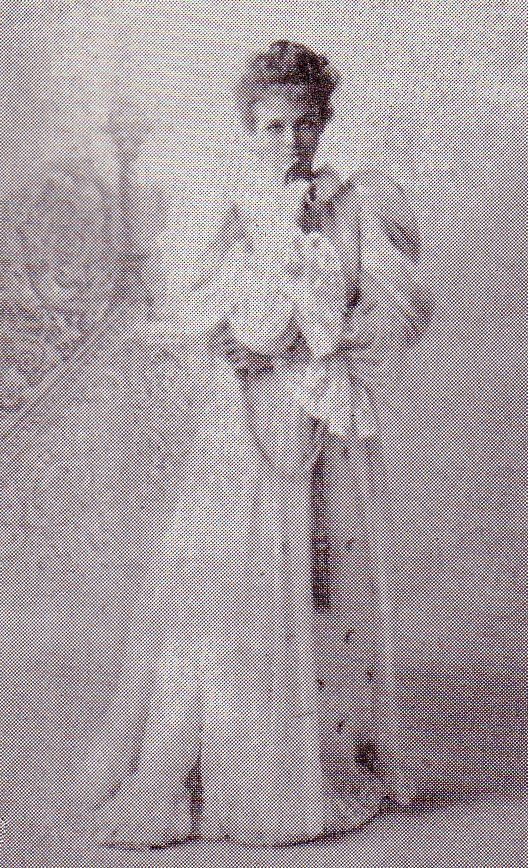
=====From the Acton Davies book=====
"Finally, the first night came October 3, 1892, a night which, as Trilby would say, ought to be marked with a white stone. It probably is in Miss Adams' memory. The theatre was Palmer's, the play The Masked Ball, an adaptation from the French by Clyde Fitch; the house was jammed to the doors by all the old Daly clientle who had come to stand or fall with Drew in this his first venture outside the Daly fold. John Drew was a success., and so was the play, but -tell it not in Gath ! -a hit was scored that night which was greater than both of theirs rolled together. Maude Adams scored that hit. Mr. Drew had a good part, and he played it admirably. In fact, his performance that night established conclusively his right to be a star. But it was not to John Drew that the biggest opportunity came that night. The following paragraph, clipped from one of the criticisms of The Masked Ball the following day: Miss Maude Adams, a young actress who until last evening had only been seen in minor roles, fairly shared the honors with Mr. Drew. Her performance was a revelation. There is one scene in the second act where in order to punish her husband for some ante nuptial remarks of his she has to pretend that she is drunk. It was just touch and go whether this scene ruined the play or not. It would have been hard to devise a more crucial test for an actress of even the widest experience and the greatest skill. In order to carry off this scene successfully it was necessary for the wife to appear to be drunk and yet be a gentlewoman at the same time."
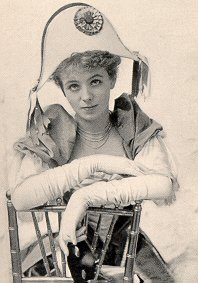
"Miss Adams achieved this feat, achieved it so successfully that the applause lasted for a full two minutes after she made her exit. If Miss Adams had done nothing else throughout the entire play than that one scene it would have stamped her as a comedienne of the first water. But her scenes of tenderness were equally good, and her alternate raillery and contrition for her artifice in the final scene were rendered with a delightfully delicate touch."
"Maude Adams' drunken scene was as great a topic of conversation in '92 as Irene Van Brugh's sensational performance of Sophie Fulgarney " in The Gay Lord Quex has been in 1901. The almost insurmountable difficulties which the part offered only served to make Miss Adams' triumph all the greater.
"To sum the matter up, Maude Adams found herself enjoying the double distinction of being the youngest leading lady on the boards and the only actress who had been promoted to the galaxy of theatrical celebrities because she didn't keep 'sober."
"The tipsy act, which excited the admiration of the critics on the first night of the performance, with its dainty and ludicrous mimicry, its delicate but irresistible drollery, was a more dangerous and difficult tubing to do than is apparent to the careless observer. The spectacle of a drunken woman on the stage is revolting and coarse to a degree, and offensive to the good taste of a cultured audience. But this woman is a lady of grace and refinement, young and beautiful, and in reality not tipsy at all, but acting the part to punish her husband, who, previous to their marriage, to intercept the advances of another aspirant to her hand, had in his anxiety warned off the other suitor by declaring that the lady had inherited an appetite for intoxicants from her father,, a most worthy and temperate man."
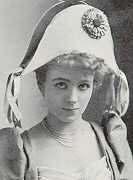
"The kindly fate which caters to the farce dramatist brings the old suitor and the wife together at a masked ball to which she has gone without her husband's knowledge,, and in company with a respectable but easily influenced old party, her husband's partner, -whose wife, too, is in ignorance of his attendance at the masked revel, but suspicious from finding his pockets filled with confetti, and jealous of the young wife. To add to the comical predicament and perplexity of the play, of course the old suitor tells the wife of her husband's accusation, and she resolves to revenge herself by appearing to be the victim of the vice of which he has accused her."
"It is upon the scene following the revelation of the suitor to the husband that he has met the wife, the pretty "Susanne," at the ball, and when the older woman, Madame Poulet, is endeavoring to obtain satisfactory explanation of her husband's conduct, which he is endeavoring not to give, that the tipsy wife comes reeling out of her dressing-room with her salubrious: "Good-morning, Paul! Hello, Paulie ! " and,, with a little lurch and uncertain and dizzy steps, approaches the irate Madame Poulet with the deliciously funny : "Ah, Madame Foulet! Your husband is a nice man, isn't he ? A very n-nice man ; but he can't d-dance very well. I think he has too many f-feet." Then, turning to her horrified husband with a maudlin and vacant smile, she adds, "Ah ! but he holds you so well!""
"'Where were you last night?' demands the furious husband."
" 'Why, really," with a careless little laugh, 'I- I don't know!' It is a risky question, and she realizes it, and, slurring her answer, she reels, sways, and sinks into a chair with a funny and puzzled "I think I'll have to sit down -a minute."
"The delicate and slight physique of the actress, the small and spiritual face framed in fair hair, the low, sweet voice and pretty English accent, above all the tacit understanding which the actress establishes between herself and her audience that she isn't really intoxicated., the mischievous delight she manages to convey to them at the despair of her husband, and the success of her scheme of revenge all unite in saving the comical mimicry of insobriety from the slightest approach to coarseness."
"The daintiness of her roguishness was emphasized, too, by a soft and simple gown of pink brocade, overhung with floating draperies of chiffon and girdled beneath the bust in Directoire fashion."
"She carried a single long-stemmed flower in her hand, waving it about with aimless grace, and when at the close of the scene she exclaimed, "You don't know how I want a d-drink of water," with a last little sick and dizzy glide and a desperate effort to right herself, the storm of applause breaks out. "It wasn't easy to do," said Miss Adams in an interview at the time".
"You see, I couldn't get tipsy myself to make my conception of the part, for when you are really intoxicated you don't know how you don't know how you do feel, and can't remember what you do at all afterward, - at least, so the gentlemen say. And I didn't dare to study the part from really tipsy women, because I would overdo it then and shock people."
"Besides, I am not really drunken in the piece. no, I must study it as a sober woman trying to act intoxicated, and yet never deceiving my audience for a minute as to the truth. So I thought over it, dreamed over it, acted it out before the mirror over and over for weeks entirely through my imagination. Indeed, you might call the whole business a flight of tipsy imagination."
"For really, you know, it is not at all like me,, though I am fond of comedy. My old friends wonder at it. One of the ladies of the Southern company said to me, Why, whatever has gotten into you ? You never used to touch a drop with us!' and I told her I had gone to the admonition bow-wows and was tipsy every night now."
=====From the book My Years on the Stage by John Drew 1921=====
The play selected for my first appearance under the new management was The Masked Ball by Alexandre Bisson and Albert Carre. This play took its name from the celebrated carnival, Beglione, which is held at Nice during the winter. The adaptation was made by Clyde Fitch, whose play, Beau Brummel, had made so great an impression when played by Richard Mansfield.
(Maude Adams's mother, Annie Adams, played the part of Mme. Bergomat.)
Eugune Presbrey, who was the first husband of Annie Russell, directed the production of The Masked Ball. Frohman came to rehearsals himself, and he did a good deal of the directing. Often he made suggestions, and good ones, but he never assumed the job of general stage director or producer.
The Masked Ball was a great success, and we played it two seasons. It was a conventional farce, but it gave me, in the role of Paul Blondet , a fairly good opportunity. Maude Adams made a decided impression. In one scene in which she simulated tipsiness she was particularly adroit.
Accordingly, at the end of the second act, she feigns tipsiness in order to shock the husband with whom she is really in love. It was admirably done, deliciously done. There was nothing vulgar about the scene; for, in the first place, she was not supposed to be intoxicated. Maude Adams did the whole episode daintily and with much charm. She carried a red rose which she would alternately smell and wave about. This was her own idea, and it was carried out very prettily.
The part of Suzanne established Maude Adams. She scored a greater success in my company as Dorothy in Rosemary, but after her performance in The Masked Ball there was no doubt of her ability and charm.
=====Charles Frohman: Manager and Man by Issac F. Marcosson and Daniel Frohman, with an Appreciation by James M. Barrie. 1916=====
"The Masked Ball" opened October 3, 1892, in the presence of a representative audience. It was an instantaneous success.
The performance, however, had a human interest apart form the star. Maude Adams, for the first time in her career, had a real Broadway opportunity, and she made the most of it in such a fashion as to convince Frohman and every one else that before many years were past she, too, would have her name up in electric lights. She played the part of Zusanne Blondet, a more or less frivolous person, and it was in distinct contrast with the character that she had just abandoned, that of Nell,, the consumptive factor-girl in "The Lost Paradise."
As Zusanne in "The Masked Ball" Miss Adams went to a ball and assumed tipsiness in order to influenced her dissipated husband and achieve his ultimate reformation. The way she prepared for this part was characteristic of the woman. She wore a hat with a long feather, and she determined to make it a "tipsy feather." This feature became one of the comedy hits of the play, but in order to achieve it she worked for days and days to bring bout the desired effect. The result of all this painstaking preparation was a brilliant performance. When the curtain went down on that memorable night at Palmer's Theater the general impression was:
"Maude Adams will be the next Frohman star."
Seldom in the history of the American theater has another event been so productive of far-reaching consequence as "The Masked Ball." It brought Clyde Fitch into contact with the man who was to be his real sponsor; it made John Drew a star; it carried Maude Adams to the frontiers of the stellar realm; it gave Charles Frohman a whole new and distinguished place in the theater.
Frohman now had two big stars, John Drew and William Gilette. A half-dozen other were in the making, chief among them the wistful-eyed little Maude Adams, who was not approaching the point in her career where she was to establish a new tradition for the American stage and give Charles Frohman a unique distinction.
When Charles Frohman put Maude Adams opposite John Drew in "The Masked Ball" he laid the foundation of what is, in many respects, his most remarkable achievement . The demure little girl, who had made her way from child actress through the perils of vivid melodrama to a Broadway success, now set out on the real highway to a stardom that is unique in the annals of the theatre.
=====Hear the Distant Applause! Six Great Ladies of the American Theatre by Marguerite Vance, 1963=====
John Drew, while a perfectionist in his work, was an exponent of the value of the unexpected on the stage. In other words, his cast had to be constantly on the alert for interpolations, baffling little intrusions of unrehearsed business, which called for quick thinking. Maude Adams, her frail, quicksilver being perfectly attuned to the unexpected, seldom, if ever, missed an extemporaneous cue. The press was quick to evaluate her work, and one of her earliest notices followed her performance in The Masked Ball when John Drew waxed mischievous. It read: "Miss Adam's exceedingly delicate and delightfully humorous treatment of a trying role was a revelation. It was just touch and go whether one scene ruined the play or not, where to punish her husband she was to appear drunk and yet be a gentlewoman. Miss Adams achieved this feat so successfully that the applause lasted a full two minutes. That one scene stamped her as a comedienne of the first water. And her scenes of tenderness, her alternate raillery and contrition, were rendered with a delightfully delicate touch."
=====American Theatre: A Chronicle of Comedy and Drama, 1869-1914 by Gerald Bordman; Oxford University Press, 1994=====
John Drew was the star of The Masked Ball ( 10-392), Palmer's), Clyde Fitch's adaptation of Alexan dre Bisson and Albert Carr's Le Vglione. Broadway wags gleefully noted that it was housed at a theatre directly across from Daly's, where Drew had been a fixture for so long. But Drew was reputed to have been annoyed that Daly chose his plays more with Ada Rehan than with him in mind, and the producer, Charles Frohman, had his own score to settle with Daly, who once had slighted him. The play made light of a man who win a girl through deception. Louis Martinot ( Harold Russell), learning that he is called away, asks his buddy, Dr. Paul Blondet ( Drew), to woo Martinot's sweetheart, Suzanne ( Maude Adams), for him. Blondet agrees, only to fall in love with Suzanne himself. So he writes Martinot warning him that Suzanne's family is disreputable and that Suzanne is something of a tippler. By the time Martinot returns (disguised in a false mustache), Blondet has married Suzanne. His return coincides with a masked ball. When Blondet discovers that Martinot will attend the party, he ships Suzanne off to mama's, but Suzanne makes her escape and goes to the ball. There the truth comes out. Although she loves Blondet, she is outraged-not so much by his betrayal of his friend as by his depiction of her as a secret boozer. She stages a drunk scene to put hubby in his place. Drew's feather-light, throwaway style was perfect for a comedy with somewhat unpleasant undertones, and accordingly he was awarded the lion's share of encomiums in the morning-after notices. But Maude Adams was also singled out for her skillful rendition of the drunk scene--knowing and comic enough to be telling and amusing, all the while never offending late 19th-century strictures. The play ran until late January. The tour that followed set a pattern for years to come, with Frohman offering Drew to New York in a new vehicle, usually in the fall, then heading out across the country with New York's praises (they hoped) serving as advance insurance. It was a policy that Sothern and others also had adopted.
=====A History of the Theatre in America from Its Beginnings to the Present Time Vol. 2 by Arthur Hornblow; J.B. Lippincott Company, 1919=====
In 1892, John Drew, so long leading man at Daly's, became a star under the management of Charles Frohman. Clyde Fitch had been engaged to adapt for him a comedy by Alexander Bisson and Albert Carr, and in this piece, called "The Masked Ball," Mr. Drew, supported by Maude Adams, began his successful stellar career at Wallack's on October 3.
Reviews
The following is one of the actual reviews of the play:
"Miss Adams exceedingly delicate and delightfully humorous treatment of a trying role was a revelation. It was just touch and go whether one scene ruined the play or not, where to punish her husband she was to appear to be drunk and yet be a gentlewoman. Miss Adams achieved this feat so successfully that the applause lasted a full two minutes. That one scene stamped her as a comedienne of the first water. And her scenes of tenderness, her alternate raillery and contrition, were rendered with a delightfully delicate touch."
Harper's Weekly of January 31, 1893, had this to say:
"It is difficult to see just who is going to prevent Miss Adams from becoming the leading exponent of light comedy in America."
The Argonaut, in relation to her "drunken" scene, wrote of her that "Miss Adams goes through this scene with so much humor, so much delicate gaiety and refined piquancy, that all suggestion of coarseness or vulgarity are lost sight of in the finished daintiness that only innate refinement can impart."
"Miss Adams, by her exceedingly delicate and delightfully humorous treatment of a trying role, fairly shared the honors with the hero of the night." New York Times, Oct. 4, 1892
"Maud Adams, not John Drew, has made the success of The Masked Ball at Palmer's, and is the star of the comedy. Manager Charles Frohman, in attempting to exploit one star, has happened upon another of greater magnitude. Mr. Drew has been so thoroughly drilled and trained to support an actress that he cannot stand comfortably by himself, and, on the first night, soon took refuge behind the petticoats of Maud Adams, as he has so often done behind those of Miss Rehan. The critics were very kind to him and gave Manager Frohman valuable assistance in making a star actor out of him, but the public know what and whom they likeand are not to be humbugged; and,consequently, the news editors, whose business it is to follow the public, fill the papers with pictures of Maud Adams, and interviews with her and accounts of her career. "Spirit of the Times, Oct. 22, 1892
"This device of the playwright's might have easily miscarried, for the slightest coarseness in the young lady's mimicry of inebriety would have been unpleasant, but Maud Adams, the actress to whom the task had been entrusted, gave the dantiest and funniest imaginable drollery to the scene. Miss Adams has been for years admired in various secondary roles, but here she came out suddenly into pronounced favor as the feminine leader in the Drew company. Her triumph was won by the gentlest sort of adroit comicality." New York Sun, Oct. 4, 1892.
"She is now in her proper element in light modern comedy, and it is as a comedienne that she will probably continue to be best known and best liked. It is a good deal to say of so young a woman, but it is rather difficult to see just who is going to prevent Miss Adams from becoming the leading exponent of light comedy in America...What Miss Adams should do now is to burn her scrapbook of notices, if she keeps one, and all the articles about her leap into success, and prepare to lay siege to the place she will take some day on the American stage...She is like a very fine violin that is to be played upon some day, and which should in the mean time be kept away from open windows and steam heat, and touched only by the best artists, who would play only the best music, and then, when the time comes, the instrument will be in good order and give out the best music...She can afford to wait. For when she is ready to take the place she is sure to take some day, she will find very few others there to crowd her." Harper's Weekly, Jan. 1893
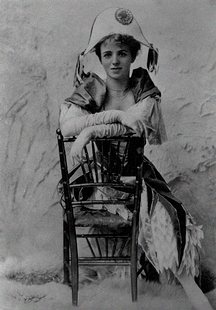
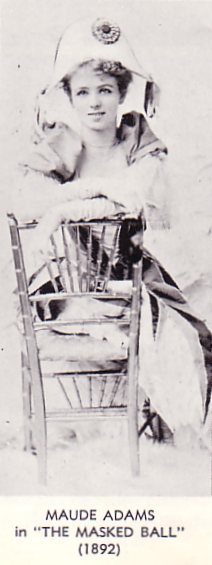
 The Trenton Times, May 25, 1893 |
A positive review, noting how young Maude Adams is.
|